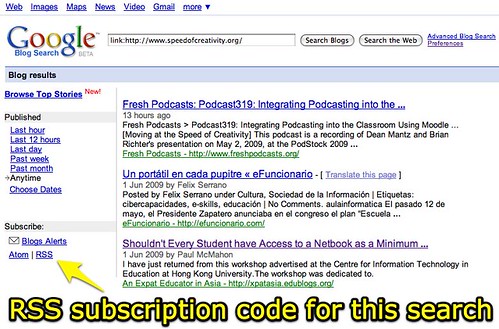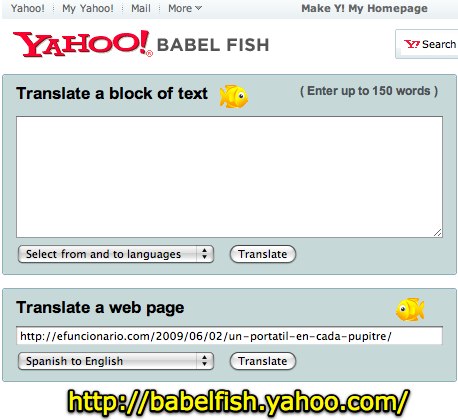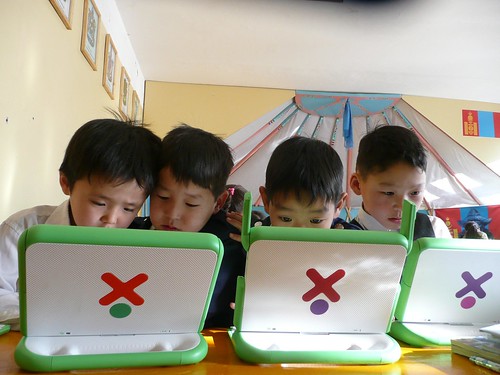This evening reading one of Chris Pirillo’s old posts, I noticed in his sidebar links for “My Profiles” he includes a link for “Blog Mentions” which includes code for a Google Blog Search for his site:
http://blogsearch.google.com/blogsearch?hl=en&scoring=d&partner=wordpress&q=link:http://chris.pirillo.com/
I’m not lacking digital reading material these days, thanks in large part to the wonderful educational bloggers to whom I subscribe in Google Reader, but I am always on the lookout for ways to catch conversations and connections which point back to something I’ve written in the past. Looking at the code Chris used for this link, it was easy to customize this for my own blog by simply replacing the last link in the URL:
http://blogsearch.google.com/blogsearch?hl=en&scoring=d&partner=wordpress&q=link:http://www.speedofcreativity.org/
After visiting this Google Blog Search page, I copied the RSS link for this canned search:
http://blogsearch.google.com/blogsearch_feeds?hl=en&scoring=d&q=link:http://www.speedofcreativity.org/&ie=utf-8&num=10&output=rss
I made one adjustment to this link, however, before subscribing to it in Google Reader. I changed the number of item results in the search query from 10 to 50:
http://blogsearch.google.com/blogsearch_feeds?hl=en&scoring=d&q=link:http://www.speedofcreativity.org/&ie=utf-8&num=50&output=rss
Then I subscribed in Google Reader, and added the feed to my “personal” category. I don’t read posts in that category every day, but this does provide a way to find other blog posts which link to my own blog that I might not otherwise notice. Examples I discovered tonight include Clif Mim’s Professional Development Meme 2009 from May 23rd, and Felix Serrano’s post “Un portátil en cada pupitre.” I do read a bit of Spanish, but since my translation skills are far slower than Yahoo Babel Fish I used its free translation functionality to generate an English version of Felix’s post.
In that post, Felix addresses a recent proposal by José Luis Rodríguez Zapatero, the Prime Minister of Spain, who announced a bold plan to support 1:1 computing. Felix is a telecommunications engineer in Spain, according to his LinkedIn profile, “Coordinador de Sistemas y Aplicaciones at OEPM.” Again thanks to Yahoo! Babel Fish, I was able to glean the gist of Prime Minister Zapatero’s proposal: Government-provided laptops for all students in grade five through the end of secondary school.
Thanks to both Google Blog Search and Yahoo! Babel Fish, I composed this reply to Felix’s post, in English:
Thanks for your quotation of my blog post on ISTEconnects. I want to clarify several things, however, because I think you are attributing those words to me instead of to Dr. Clayton Christensen and his co-authors, and I think you also may be taking them out of context. That quotation is from:
From Christensen, Horn & Johnson. Disrupting Class: How Disruptive Innovation Will Change the Way the World Learns. McGraw Hill. 2008. Pages 72-73.
The context of that quotation is NOT classrooms in which 1:1 computing is a reality. If I understand the proposal of Spanish Prime Minister Zapatero correctly, he is wanting students in grades five through the end of secondary school to be provided with a laptop computer. Christensen and his co-authors are not refuting, in the passage I quoted and you cited, the transformative potential of 1:1 computing projects. Rather, they are observing (and echoing Dr. Larry Cuban on this) that the ways MOST U.S. schools have purchased computer technology in the past, outfitting labs and providing desktop computers for teachers, have NOT had a transformative effect on teaching and learning.
I heartily support 1:1 learning initiatives, but am quick to point out (along with many others) that “transformation” requires far more than simply hardware in the hands of all learners. The transformation of the teaching and learning environment should be the goal and at the heart of the entire learning initiative. For some insightful, recent academic research on the factors that CAN and HAVE contributed to transformative change in 1:1 schools, I commend to you the July 2008 TCER report “Third-Year (2006-07) Traits of Higher Technology Immersion Schools and Teachers” which focuses on the four middle schools in the Texas Immersion Pilot Project which most fully implemented the 1:1 initiative and saw the best results. This is available on:
http://www.tcer.org/research/etxtip/documents/y3_etxtip_qual.pdf
…and in Spanish:
Gracias por su cita de mi poste del blog en ISTEconnects. Quiero aclarar varias cosas, sin embargo, porque pienso usted está atribuyendo esas palabras a mí en vez al Dr. Clayton Christensen y sus co-autores, y pienso que usted también puede sacarlas fuera de contexto. Esa cita es de: De Christensen, & del cuerno; Johnson. Clase de interrupción: Cómo la innovación quebrantadora cambiará la manera el mundo aprende. Colina del McGraw. 2008. Pagina 72-73.
El contexto de esa cita no es las salas de clase en las cuales el 1:1 que computa es una realidad. Si entiendo la oferta del primer ministro español Zapatero correctamente, él quisiera que proporcionaran los estudiantes en los grados cinco a través del extremo de la escuela secundaria un ordenador portátil. Christensen y sus co-autores no están refutando, en el paso que coticé y usted citó, el potencial transformativo del 1:1 que computaba proyectos. Algo, están observando (y el Dr. Larry cuban el repetir en esto) que las maneras LA MAYORÍA de las escuelas de los E.E.U.U. han comprado la informática en el pasado, equipando laboratorios y proporcionando las computadoras de escritorio para los profesores, no han tenido un efecto transformativo sobre la enseñanza y el aprendizaje
Apoyo caluroso el 1:1 que aprende iniciativas, pero la aprisa para precisar (junto con muchos otras) ese ” transformation” requiere lejos más que simplemente el hardware en las manos de todos los principiantes. La transformación del ambiente de la enseñanza y de aprendizaje debe ser la meta y en el corazón de la iniciativa de aprendizaje entera. Para una cierta investigación académica profunda, reciente sobre los factores que PUEDEN y haber contribuido al cambio transformativo en escuelas del 1:1, elogio a usted el ” del informe del julio de 2008 TCER; (2006-07) rasgos de tercer año de las escuelas y de los profesores de la inmersión de una tecnología más alta” que se centra en las cuatro escuelas secundarias en el proyecto piloto de la inmersión de Tejas que mejor ejecutó la iniciativa del 1:1 y consideró los mejores resultados. Esto está disponible prendido:
http://www.tcer.org/research/etxtip/documents/y3_etxtip_qual.pdf
I know that translation is not perfect, but it is both better and faster than I could do this evening in the time I devoted to reading and responding to this post.
Google Blog Search and Yahoo! Babel Fish are POWERFUL tools for learning, collaboration, and dialog. We need to be using these with students in our classrooms!
Clif, I’ll work on a reply to your PD Meme in the week ahead! 🙂
Technorati Tags:
1to1, blog, education, laptop, track, spanish, english, translate, yahoo, yahoo!, babel, fish, search, spain




Comments
6 responses to “Tracking and translating blog conversations: Google Blog Search Mentions and Yahoo! Babel Fish”
It’s a bit ironic that we talked about the importance of keeping an eye on your digital identity with Google Alerts, etc. The strategy that you shared in this post really isn’t much of a stretch from that…but I guess it took someone like Chris Pirillo to think of it. LOL! Thanks for sharing this, Wes.
I’m looking forward to seeing your pdmeme09 goals.
See you at EBC09.
Estimado señor Fryer:
Gracias por su puntualización en mi Blog http://efuncionario.com. La he introducido en el artículo, para que en todo caso se aprecie el contexto y opinión correctamente. Ya he contestado a su amable opinión en mi blog.
Ya veo que usa usted Yahoo! Babel Fish para la traducción. Por mi parte, uso Google Translate. En ambos casos las traducciones son bastante buenas y pienso que suficientes para entender el significado del texto, aunque no son muy buenas desde el punto de vista del estilo literario.
Por ello suelo usar la traducción como un primer paso, y después, haciendo uso de mis escasos conocimientos de inglés, le añado algunos retoques.
Aprovechando la tecnología, he puesto en la página principal de mi Blog unos enlaces que proporcionan la traducción automática a otros idiomas:
eFunctionary in englisheFuncionari en catalá
eFuncionario en italianoeFonctionnaire en françaiseFuncionário em português
———–
Dear Mr. Fryer:
Thank you for your clarification and comment in my blog. I have already replied to your kind opinion on the same place.
I see that you use Yahoo! Babel Fish to translate. For my part, I use Google Translate. In both cases the translations are quite good and I think enough to understand the meaning of the text, although not very good from the standpoint of literary style.
Therefore I use automatica translation tools as a first step, and then, using my limited knowledge of English, I add a few touches.
Taking advantage of technology, I put on the front page of my Blog efuncionario.com some links that provide machine translation into other languages:
eFunctionary in englisheFuncionari en catalá
eFuncionario en italianoeFonctionnaire en françaiseFuncionário em português
This is simply extraordinary.
The notion that if you speak English, and enough Spanish/French/Italian/Chinese/Hindi to adjust a translation done automatically…
OMG, as our students would say…
Thanks for the brilliant idea.
Hi Wes, definitely Google Reader is good but I think visually a RSS widget would be a cleaner looking option for your readers to follow the conversation.
I use SpringWidgets RSS reader on The Edublogger right hand sidebar. You can choose for the posts to be read as titles or entire post when you customise the widget. Here is what the widget looks like with my feed. I’ve sent you the code this widget using your RSS feed, by email, in a txt file so you can use if you want.
Yes I also prefer to use Google translate.
Hi.
Just a quick note. 1computer:1child teaching, with cheap portable netbooks is already being experimented in some places around the world and a first nationwide trial is now one year old in Portugal.
Apart the numerous pitfalls of distributing to every primary school student a nearly free (in same cases entirely free) netbook and attempting to crash-change decades long didactic habits, it is going really well and no wonder neighbouring Spain will follow up with the same strategy.
Since you are clearly interested in IT affecting schools and learning, i couldn’t help dropping the hint. If you want to research online news and blog discussions, look for the “classmate” and “magalhaes”.
Nice blog, btw.